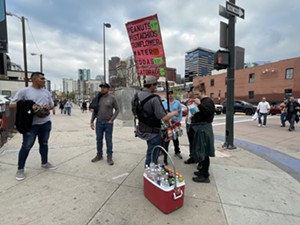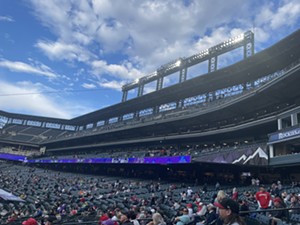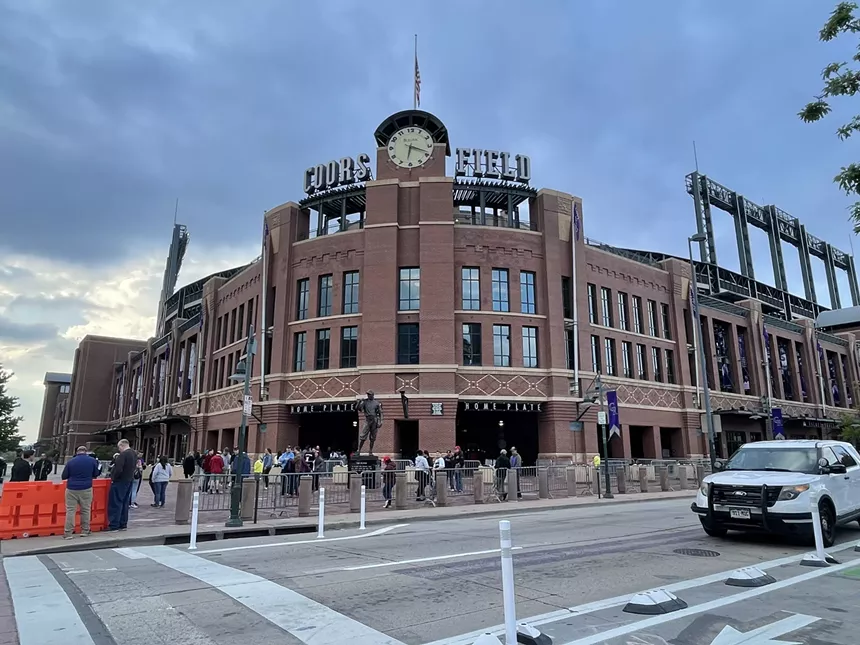Bravo remembers how busy the area outside the ballpark — at 20th and Blake Streets — was when the MLB team was last in the playoffs, in 2018. Vendors like herself used to post up in the shadow of Coors by the dozen to dish out cheaper ballpark eats to fans, with nearly forty different peanut peddlers licensed to sell before the pandemic, according to Department of Excise & Licenses records.
Now, Bravo is one of just eight.
“People lost interest and stopped trying to get their license,” she says, speaking in Spanish with her son helping translate.
Vendors have seen a 79 percent drop in numbers since before the pandemic; there were 39 licensed food sellers in January 2020. Those in the industry say bad weather and an uninspiring 2023 Rockies team are to blame for the drop this year.
“If it’s hot, it’s fine,” says vendor Jesus Rodriguez, who’s been selling snacks before Rockies games for more than two decades. “If it’s cold, no business.”
Amelia Vazquez, another longtime street seller whose son translated for her, tells Westword: “The Rockies aren’t doing well, so now many people aren’t attending the games. They lose. Everybody loses.”
With a record of 22-29, the Rockies are currently sitting in last place in the National League West division and have the sixth-worst winning percentage in Major League Baseball. Bud Black’s squad has managed to go 13-9 in May so far, but the month has also been the fifth wettest on record this year — which vendors think has led fans to stay away.
Before this season, the Rockies finished in the top ten for average attendance in Major League Baseball six years in a row. For 2023, attendance has been trending much lower — with the team registering its first showing of fewer than 19,000 fans since 2013 on April 19.
According to Baseball Reference, this season’s attendance per game is currently 25,970 compared to last season’s 32,067. The good news: fans have a decent chance of never having to wait in lines.
Bravo says business has been busy on weekends, as usual, but vendors just haven’t recovered from the pandemic.
Luckily for food sellers, getting a license isn’t an onerous process. Licensees must share their criminal history, have a valid state or federal ID, provide a character reference and show that their name is what they say their name is. The City of Denver recently reworked the rules to allow undocumented people to get food peddler licenses, too.
From there, there’s a city inspection, and then they’re all set.
The application fee is $25 and the license fee is $50. Peddlers can’t have tables or wagons unless they apply for a disabled-peddler exemption. “All goods and/or products must be carried on an individual peddler’s person and may not be carried, displayed, or stored in or on any carts, dollies, tables, wagons, coolers, or similar devices,” the city’s food peddler guidelines specify.
There is one quirk: Peddlers can’t stand still while selling, they must move about.
The area in which they can roam has shrunk in recent years because the Rockies obtained a Public Sidewalk Occupancy Permit to shut down the sidewalk outside games; that permit requires people to dismount bikes, scooters and skateboards on 20th and 22nd Streets along Blake Street and prevents vendors from selling directly in front of the stadium.
Vazquez says she doesn’t sell nearly as much from her new spot at the corner of 22nd and Blake streets as she used to when she sold in front of the stadium entrances on Blake Street.
The Rockies did not respond to requests for comment, but the Denver Department of Transportation and Infrastructure did share the Rockies 2023 Public Sidewalk Occupancy Permit with Westword.
“The intended purpose is to assist with the safety of the general public and to assist with DPHE health and safety guidelines and DPD/Rockies security, safety and crowd control for ticketed spectators,” the permit application says regarding why the restrictions are needed.
The team will pay just $1,393.70 to shut down the street and sidewalk in front of the stadium in 2023 thanks to a special event reduction that saves the franchise over $25,000. The usual rate is $344 per day, but the Rockies pay just 5 percent of that amount to close the sidewalk for four hours before first pitch until two hours after last pitch.

Keeping prices low enough to entice customers but high enough to make a profit is tricky, Jesus Rodriguez says.
Catie Cheshire
Although the team is getting a reduced rate, the peddlers aren’t and say inflation has made turning a profit much more difficult.
Bravo, for instance, has had to raise her prices — as have other vendors. Daniel Moffat, who has been in the peddling game for about seven years now, says hikes in the price of goods makes the gig even tougher.
Rodriguez notes that the cost of parking close enough to Coors Field — so that he can keep drinks cold in the car then bring them out to customers — has also hurt his profit margin. He says five years ago, he’d be on the streets with ten or twenty other vendors each game. Now he looks around and barely sees anyone.
But the street vendors aren’t throwing in the towel just yet.
They’re hoping nicer weather and school being out for the summer will be a home run for their industry.
“The beginning of this season, I’m not making enough to make it worth it,” Moffat says, “but it will get up.”
Stay connected with us on social media platform for instant update click here to join our Twitter, & Facebook
We are now on Telegram. Click here to join our channel (@TechiUpdate) and stay updated with the latest Technology headlines.
For all the latest For Top Stories News Click Here


